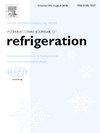建筑空调系统优化中的智能技术研究综述
IF 3.8
2区 工程技术
Q1 ENGINEERING, MECHANICAL
International Journal of Refrigeration-revue Internationale Du Froid
Pub Date : 2025-05-01
DOI:10.1016/j.ijrefrig.2025.04.027
引用次数: 0
摘要
可持续发展目标(sdg)旨在使城市和社区更加舒适、安全和环保。可持续发展目标要求建筑业走低碳可持续发展道路。在建筑物的运行阶段,空调系统消耗的能源约占建筑物总能源消耗的22%。优化空调运行控制策略对节能减排具有重要意义。然而,建筑空调系统是一个多参数、非线性、时变、多目标值的复杂系统。传统的空调控制方式已不能满足动态环境下节能和提高舒适性的复杂需求。目前,许多研究人员正在研究优化建筑空调系统的智能技术。本文对近年来该领域的相关文章进行了分类,讨论了控制方法的优化和智能技术的应用等方面,重点分析了模型预测控制、机器学习、深度学习和智能优化算法等各种智能技术的特点,以及它们在建筑空调系统优化控制领域的优势。本文章由计算机程序翻译,如有差异,请以英文原文为准。
A review of research on intelligent technology in building air conditioning system optimisation
The Sustainable Development Goals (SDGs) aim to enhance cities and communities more comfortable, safe, and environmentally friendly. The SDGs state that the construction sector should take a low-carbon and sustainable development path. During the operation phase of buildings, the energy consumed by air conditioning systems makes up approximately 22 % of the overall energy consumption of a building. The optimisation of the air conditioning operation control strategy is significant for saving energy and cutting emissions. However, a building air conditioning system is a complex system with multiple parameters, nonlinearity, time variance, and multiple objective values. Traditional air conditioning control methods cannot meet the complex needs of energy saving and comfort improvement in a dynamic environment. Currently, many researchers are studying intelligent technologies for optimising building air conditioning systems. This literature review categorises the relevant articles in this field in recent years, discusses the aspects of optimisation of control methods and the application of intelligent technologies, and focuses on the analysis of the characteristics of various intelligent technologies such as Model Predictive Control, Machine Learning, Deep Learning, and intelligent optimisation algorithms, and their advantages in the domain of optimising control for building air conditioning systems.
求助全文
通过发布文献求助,成功后即可免费获取论文全文。
去求助
来源期刊
CiteScore
7.30
自引率
12.80%
发文量
363
审稿时长
3.7 months
期刊介绍:
The International Journal of Refrigeration is published for the International Institute of Refrigeration (IIR) by Elsevier. It is essential reading for all those wishing to keep abreast of research and industrial news in refrigeration, air conditioning and associated fields. This is particularly important in these times of rapid introduction of alternative refrigerants and the emergence of new technology. The journal has published special issues on alternative refrigerants and novel topics in the field of boiling, condensation, heat pumps, food refrigeration, carbon dioxide, ammonia, hydrocarbons, magnetic refrigeration at room temperature, sorptive cooling, phase change materials and slurries, ejector technology, compressors, and solar cooling.
As well as original research papers the International Journal of Refrigeration also includes review articles, papers presented at IIR conferences, short reports and letters describing preliminary results and experimental details, and letters to the Editor on recent areas of discussion and controversy. Other features include forthcoming events, conference reports and book reviews.
Papers are published in either English or French with the IIR news section in both languages.

 求助内容:
求助内容: 应助结果提醒方式:
应助结果提醒方式:


